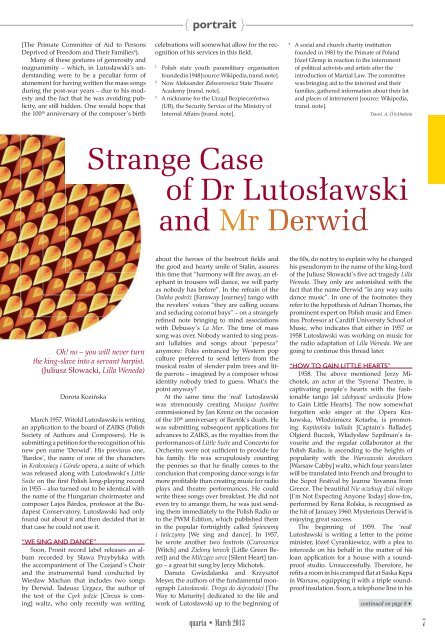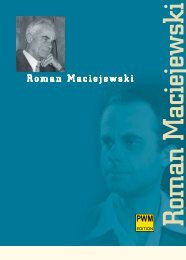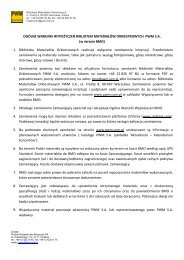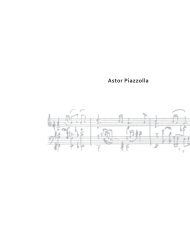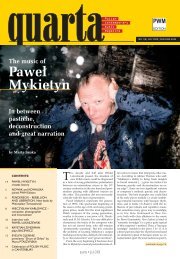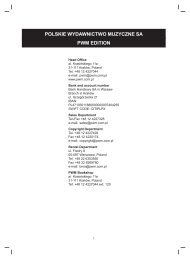On Paweł Łukaszewski's music
On Paweł Łukaszewski's music
On Paweł Łukaszewski's music
You also want an ePaper? Increase the reach of your titles
YUMPU automatically turns print PDFs into web optimized ePapers that Google loves.
[The Primate Committee of Aid to Persons<br />
Deprived of Freedom and Their Families 4 ).<br />
Many of these gestures of generosity and<br />
magnanimity – which, in Lutosławski’s understanding<br />
were to be a peculiar form of<br />
atonement for having written the mass songs<br />
during the post-war years – due to his modesty<br />
and the fact that he was avoiding publicity,<br />
are still hidden. <strong>On</strong>e would hope that<br />
the 100 th anniversary of the composer’s birth<br />
{ portrait }<br />
celebrations will somewhat allow for the recognition<br />
of his services in this field.<br />
1<br />
Polish state youth paramilitary organisation<br />
founded in 1948 [source: Wikipedia, transl. note].<br />
2<br />
Now Aleksander Zelwerowicz State Theatre<br />
Academy [transl. note].<br />
3<br />
A nickname for the Urząd Bezpieczeństwa<br />
(UB), the Security Service of the Ministry of<br />
Internal Affairs [transl. note].<br />
4<br />
A social and church charity institution<br />
founded in 1981 by the Primate of Poland<br />
Józef Glemp in reaction to the internment<br />
of political activists and artists after the<br />
introduction of Martial Law. The committee<br />
was bringing aid to the interned and their<br />
families, gathered information about their lot<br />
and places of internment [source: Wikipedia,<br />
transl. note].<br />
Transl. A. Ó hAlmhain<br />
Strange Case<br />
of Dr Lutosławski<br />
and<br />
Oh! no – you will never turn<br />
the king-slave into a servant harpist.<br />
(Juliusz Słowacki, Lilla Weneda)<br />
Dorota Kozińska<br />
March 1957. Witold Lutosławski is writing<br />
an application to the board of ZAIKS (Polish<br />
Society of Authors and Composers). He is<br />
submitting a petition for the recognition of his<br />
new pen name ‘Derwid’. His previous one,<br />
‘Bardos’, the name of one of the characters<br />
in Krakowiacy i Górale opera, a suite of which<br />
was released along with Lutosławski’s Little<br />
Suite on the first Polish long-playing record<br />
in 1955 – also turned out to be identical with<br />
the name of the Hungarian choirmaster and<br />
composer Lajos Bárdos, professor at the Budapest<br />
Conservatory. Lutosławski had only<br />
found out about it and then decided that in<br />
that case he could not use it.<br />
“WE SING AND DANCE”<br />
Soon, Pronit record label releases an album<br />
recorded by Sława Przybylska with<br />
the accompaniment of The Czejand’s Choir<br />
and the instrumental band conducted by<br />
Wiesław Machan that includes two songs<br />
by Derwid. Tadeusz Urgacz, the author of<br />
the text of the Cyrk jedzie [Circus is coming]<br />
waltz, who only recently was writing<br />
about the heroes of the beetroot fields and<br />
the good and hearty smile of Stalin, assures<br />
this time that “harmony will fire away, an elephant<br />
in trousers will dance, we will party<br />
as nobody has before”. In the refrain of the<br />
Daleka podróż [Faraway Journey] tango with<br />
the revelers’ voices “they are calling oceans<br />
and seducing coconut bays” – on a strangely<br />
refined note bringing to mind associations<br />
with Debussy’s La Mer. The time of mass<br />
song was over. Nobody wanted to sing peasant<br />
lullabies and songs about ‘pepesza 1 ’<br />
anymore: Poles entranced by Western pop<br />
culture preferred to send letters from the<br />
<strong>music</strong>al realm of slender palm trees and little<br />
parrots – imagined by a composer whose<br />
identity nobody tried to guess. What’s the<br />
point anyway?<br />
At the same time the ‘real’ Lutosławski<br />
was strenuously creating Musique funèbre<br />
commissioned by Jan Krenz on the occasion<br />
of the 10 th anniversary of Bartók’s death. He<br />
was submitting subsequent applications for<br />
advances to ZAIKS, as the royalties from the<br />
performances of Little Suite and Concerto for<br />
Orchestra were not sufficient to provide for<br />
his family. He was scrupulously counting<br />
the pennies so that he finally comes to the<br />
conclusion that composing dance songs is far<br />
more profitable than creating <strong>music</strong> for radio<br />
plays and theatre performances. He could<br />
write these songs over breakfast. He did not<br />
even try to arrange them, he was just sending<br />
them immediately to the Polish Radio or<br />
to the PWM Edition, which published them<br />
in the popular fortnightly called Śpiewamy<br />
i tańczymy [We sing and dance]. In 1957,<br />
he wrote another two foxtrots (Czarownica<br />
[Witch] and Zielony berecik [Litlle Green Beret])<br />
and the Milczące serce [Silent Heart] tango<br />
– a great hit sung by Jerzy Michotek.<br />
Danuta Gwizdalanka and Krzysztof<br />
Meyer, the authors of the fundamental monograph<br />
Lutosławski. Droga do dojrzałości [The<br />
Way to Maturity] dedicated to the life and<br />
work of Lutosławski up to the beginning of<br />
the 60s, do not try to explain why he changed<br />
his pseudonym to the name of the king-bard<br />
of the Juliusz Słowacki’s five act tragedy Lilla<br />
Weneda. They only are astonished with the<br />
fact that the name Derwid “in any way suits<br />
dance <strong>music</strong>”. In one of the footnotes they<br />
refer to the hypothesis of Adrian Thomas, the<br />
prominent expert on Polish <strong>music</strong> and Emeritus<br />
Professor at Cardiff University School of<br />
Music, who indicates that either in 1957 or<br />
1958 Lutosławski was working on <strong>music</strong> for<br />
the radio adaptation of Lilla Weneda. We are<br />
going to continue this thread later.<br />
“HOW TO GAIN LITTLE HEARTS”<br />
1958. The above mentioned Jerzy Michotek,<br />
an actor at the ‘Syrena’ Theatre, is<br />
captivating people’s hearts with the fashionable<br />
tango Jak zdobywać serduszka [How<br />
to Gain Little Hearts]. The now somewhat<br />
forgotten solo singer at the Opera Krakowska,<br />
Włodzimierz Kotarba, is promoting<br />
Kapitańska ballada [Captain’s Ballade].<br />
Olgierd Buczek, Władysław Szpilman’s favourite<br />
and the regular collaborator at the<br />
Polish Radio, is ascending to the heights of<br />
popularity with the Warszawski dorożkarz<br />
[Warsaw Cabby] waltz, which four years later<br />
will be translated into French and brought to<br />
the Sopot Festival by Jeanne Yovanna from<br />
Greece. The beautiful Nie oczekuję dziś nikogo<br />
[I’m Not Expecting Anyone Today] slow-fox,<br />
performed by Rena Rolska, is recognised as<br />
the hit of January 1960. Mysterious Derwid is<br />
enjoying great success.<br />
The beginning of 1959. The ‘real’<br />
Lutosławski is writing a letter to the prime<br />
minister, Józef Cyrankiewicz, with a plea to<br />
intercede on his behalf in the matter of his<br />
loan application for a house with a soundproof<br />
studio. Unsuccessfully. Therefore, he<br />
refits a room in his cramped flat at Saska Kępa<br />
in Warsaw, equipping it with a triple soundproof<br />
insulation. Soon, a telephone line in his<br />
continued on page 8<br />
quarta • March 2013<br />
7


